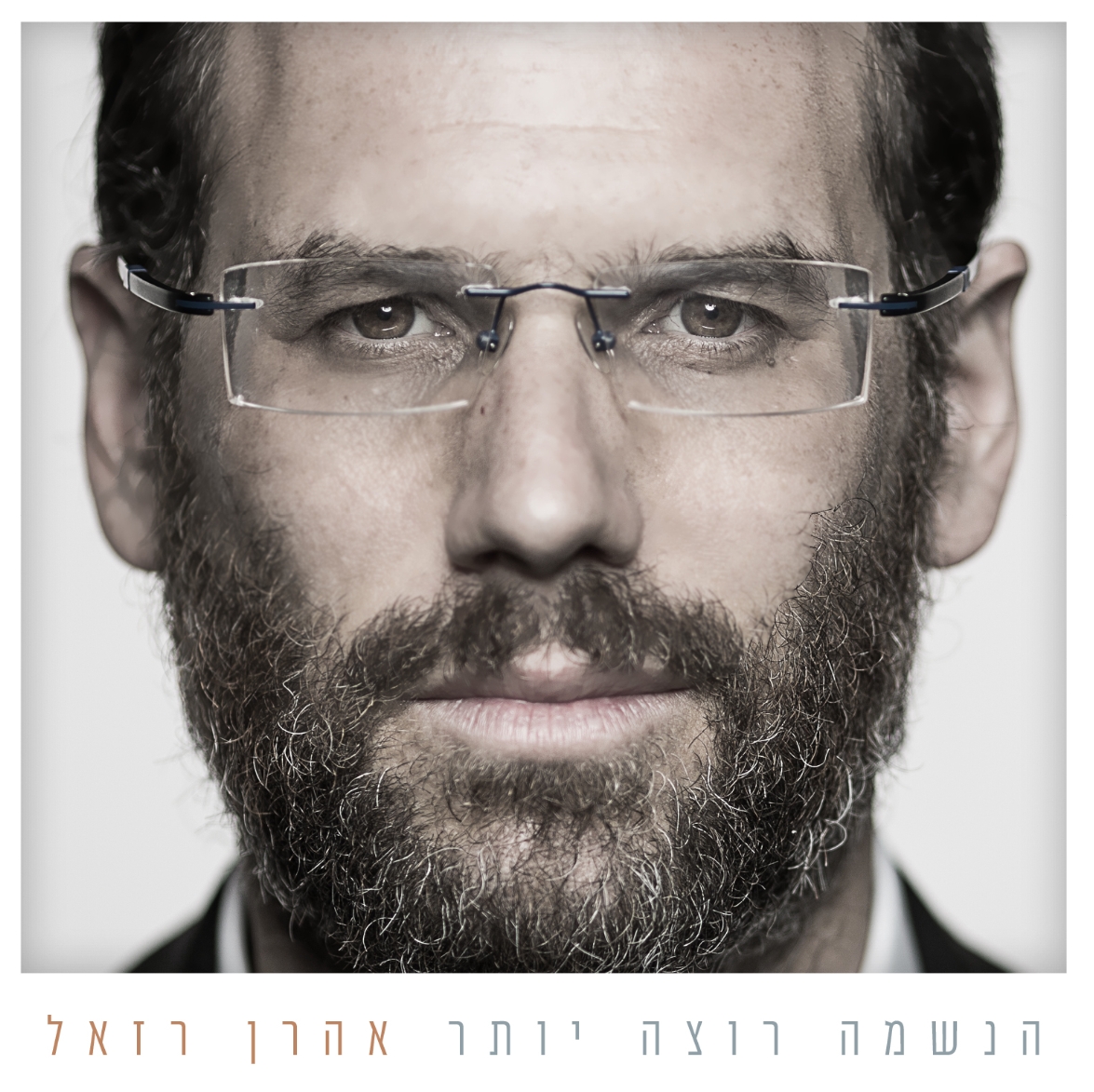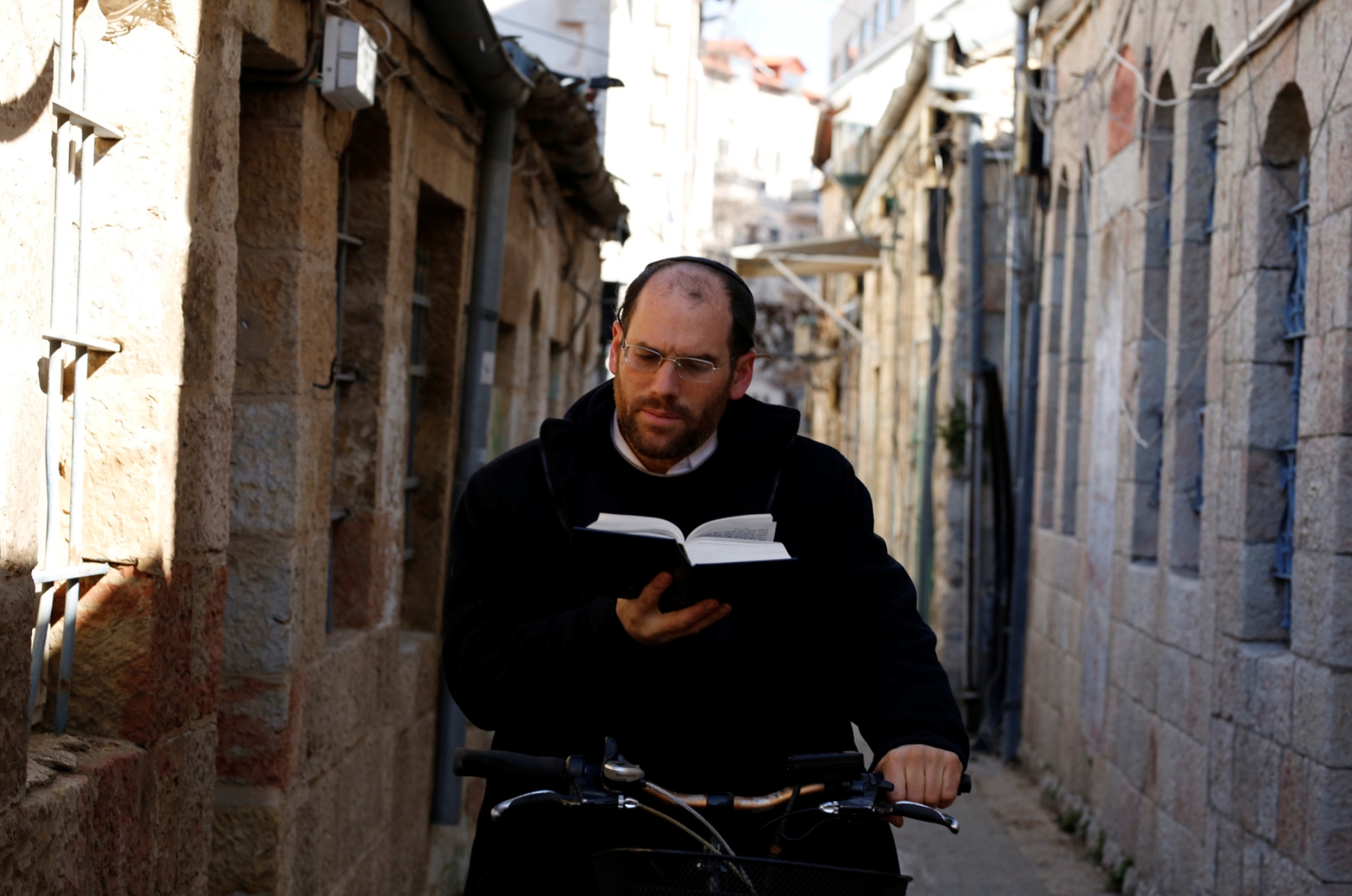Aharon Razel: 'A Teacher in Tel Aviv Told Me, They Won't Let You In, the Parents Will Create an Uproar'
In honor of his new album release, Aharon Razel shares in a special interview about his family's assimilation in the U.S., what Shuli Rand has given him, and reveals his feelings about not being played on Galgalatz.
 Aharon Razel (Photo: Ohad Romano)
Aharon Razel (Photo: Ohad Romano)'Four at ten, four at ten,' I still hear the vendors' shouts as I cross Agripas Street, descending through the Mahane Yehuda Market towards Rabbi Aryeh Levin's old house. A quick glance at my phone to recall Aharon Razel's address, accompanied by guilty feelings – how, for goodness' sake, after so many years in the neighborhood, do I still not remember?
I walk down Obadiah Somekh Street, passing by Jonathan's old studio, the eldest of the Razel family. His piano tunes, which once stirred the toughest hearts here, no longer echo from the windows. A few more steps, and on my right stands the house of Micha and Carol Razel, parents to Jonathan, Aharon, Rika, and Yehuda - a wise and kind Jerusalem rabbi.
'My brother Yehuda, the hidden brother,' Aharon tells me a few minutes after I pass by his parents' house, 'He was the first to become a scholar in our home.' Speaking of home, Razel's house, with which I meet regarding his new album release 'The Soul Wants More,' is distinctive and vibrant, even in an animated neighborhood like Nachlaot.
A narrow staircase connects the house to the street, ending in a rectangular courtyard under the open sky. From this yard, several doors are visible, the main one leading to the living room. This house contains nine children - *chamsa chamsa* - and throughout the interview, four daughters revolve around us, partly out of curiosity and partly from idleness – two sleep on the couch, a four-year-old child enjoys mopping and of course, she dirties more than she cleans, and a three-month-old baby sits on a swing, gazing dreamily at us.
Holy books adorn Razel's home from all sides, who has written many songs on matters related to holiness and Torah study, which he engages in every day until noon. This naturally gives rise to many stories related to Torah study. 'My brother Yehuda, as I began to say, was the first to become a scholar in the family. Very quickly, he started teaching lessons, in some of which I also participated. Fourteen years ago, a miracle happened to me during the 'daily page' lesson that Yehuda taught.'
He pauses for a moment and then continues: 'At the end of the lesson, I asked the guys if anyone wanted to go over the page with me, and one said 'I do.' From that day, for 14 years, we have studied together for several hours every day and do everything not to miss a single day of study. When I was abroad, several times I got up in the middle of the night, went into a quiet room in the house, and studied with him from there. In general, we have a challenge to learn in the most bizarre places. Once I even traveled to the north just because he was there.'
With a Shabbat Newsletter on the Piano
Talking about the new album, which is the reason for our meeting, brings Razel back to the days when it all started. 'When we were children, our parents became religious. We were an ordinary secular family, and when I was ten, we started keeping Shabbat. Naturally, we grew up with a lot of non-religious music, and not even Jewish music. Frankly, we didn't know Hasidic music at all. But listen, Hashem works things out in the most precise way. Because of this, returnee artists can take elements from the music they grew up with, sanctify them, and use them to do wonderful things. It's a great privilege, and I don't always comprehend it. You can't grasp how precious it is to give a person the ability to hear holy songs, thanks to sounds and styles he knows and loves.
'Additionally,' says Razel, 'this knowledge also helps me in other things. For example, a month and a half ago, we attended my grandmother's funeral in the United States. Grandma was born in Germany, her family experienced and saw very harsh things done to Jews, and blessed be Hashem they managed to escape to the U.S. A large part of our family is assimilated there, marrying non-Jews, etc. When we arrived, we wanted to bring them closer, to connect with them, so we played and sang familiar general songs for them, and through this, we opened up and connected with them, and thus we could have an influence. Honestly, there are general songs that I still really love and enjoy myself.
'By the way, I still really enjoy listening to classical music, and it also nourishes and enriches me, as I continue to play and practice it. It puts me in the place of someone who is still a student, which is very important for creativity. In Torah, it is known that scholars become more praiseworthy as they age. In contrast, in music, there is usually a preference for the young and new. You can disappear in this world very quickly. Every creator faces these questions of how to preserve his creation, how to ensure his fountain continues to flow.'
And what specifically characterizes your creation? Some say your songs don't deal with difficult and sad things but only with joy and optimism. Is there truth to that?
'There are a few things, in my opinion, that characterize my creation, and I will touch upon them later. Regarding the latter part of the question, it's a good question that I don't really have an answer to. What I can say is that I have a cheerful nature. I am optimistic by nature. And apparently, that's my mission, to sing about happy things. There are singers I really love who sing about difficult things, but for me, it's the joy in life that provides the inspiration and excitement. Although, of course, like everyone, I also have trials, crises, and questions. By the way, in the new album, there are slightly more poignant songs, but in general, I don't see myself writing songs of a broken heart. By the way, maybe that's why, apart from one song I released a few years ago, I'm not played on Galgalatz.'
 (Photo: Ohad Romano)
(Photo: Ohad Romano)This is Israel's strongest station, controlling the musical agenda. Does it bother you?
'It bothers me, to some extent. Everyone wants to get on their playlist, and it's disappointing when it doesn't happen. Especially if it's time after time after time. It’s a dramatic issue, black or white. But I can't complain because, thank God, people listen to me a lot, and I'm even pleasantly surprised by this. I don't take success for granted. In general, it's very important in this world not to feel deprived. To think—‘why am I not like him’. Just so you know, we sent songs from the new album to Galgalatz, and even they didn't get in.
'As for what characterizes my creation, I'll say a few things in this context. I once heard something very deep, which goes like this: there are four levels in creation, in ascending order – a bad and simple song, a bad and complicated song, a good and complicated song, a good and simple song. Good and simple songs, for example, are things like Rabbi Carlebach did. They are the hardest to make. If you try to write good and simple, you can easily end up bad and simple. So, I try to write good and simple songs, and occasionally I try to write good and complex ones.
'Moreover, my connection to Hashem and the Torah very much characterizes my work. I was fortunate that some people helped me to come closer to learning Torah, and Rabbi Carlebach was one of them. One of the reasons I am so connected to Rabbi Carlebach is precisely because of his Torah learning. He wouldn't have reached where he did in the music world had he not studied. It’s a prerequisite in the Jewish world. A person must be connected to Torah study. Thank God I study every day in the morning, from nine-thirty until one-thirty. And I really try not to let anything else interfere.
 (Photo: Yohanan Katz)
(Photo: Yohanan Katz)'At the same time, or rather - thanks to this, my creation is often light and full of humor. For example, I have the 'Cream Cake Song'. To this day, people request it at performances. Even people who weren't born when it was written want to hear it. I read in one of the Shabbat newsletters a halachic question, whether it is permissible on Shabbat to separate the biscuit, because of 'borer'. You need a somewhat peculiar mind for that, but I decided to compose the question and the answer. It was very difficult. It took several months with a Shabbat newsletter on the piano.
'If that's not enough, my father heard the song before it came out and feared I was making a parody of the Torah. I explained to him that, for me, it didn't come from such a place, but from wonderment. I was very excited about the fact that such a small question preoccupies the great Jewish sages. Speaking of the greats of Israel, Rabbi Nachman said that laughter is very important. And yes, the truth is I also like to be the clown, and am very drawn to humor, even though it has a price. It requires courage. At first, people didn’t know how to take me.'
Tel Aviv Youth in Yiddish
Many do not know this, but the seeds of 'Give Me This Day', a duet performed by Aharon with his brother Jonathan – which establishes itself as one of the most played and beloved songs on his new album, were planted on a night when Jonathan was in a very difficult state. 'Jonathan and his family went through a very hard period, which included frequent hospital visits. One night I came to visit them, and before I left, I left Jonathan a note on the pillow. I wrote to him: 'Are you ready for the kindness that this day will bring?' Thank God the situation improved, and things got sorted out. A few years ago, I discovered that Jonathan kept this note with him, and I was very touched.'
You mentioned Jonathan, how do you handle the inevitable comparisons between you?
'Many people think it's hard for me because of this closeness, but the opposite is true. I greatly appreciate Jonathan and learn a lot from him, so much so that I feel privileged to be compared to him. In general, academic jealousy increases wisdom, and indeed, the fact that we are both in the same field enriches me and helps me improve. Beyond that, we also perform a lot together, and his success aids my success. The most important thing to say about this is that as believers, we know that everyone has the abundance that Hashem will give them. By the way, Rabbi Elisha Vishlitzky z"l blessed us that we would always support one another, just as Aharon did not envy his brother Moshe, and Jonathan did not envy David, even though he was the king's son – who was supposedly supposed to succeed Saul his father.'
Besides Jonathan, who else do you rely on?
'My wife Efrat. She is a very important partner in my work. In many respects. Beyond that, I greatly admire Shuli Rand as an artist and am very connected to him. With the current album, I asked him if he would sit down with me on texts, and we met twice. Shuli is a very mysterious person, and we really had quality time together. I got a lot of writing tips from him. In this regard, I can also say that Yedidiya Meir is a friend who also participates in what I do. For example, I sent him the song 'The Holy Hunchback' which was written inspired by Rabbi Carlebach's story about the Piaseczno Rebbe. The song was not yet complete, but he was excited to the point that he decided to play the song as is, while it was still in the sketch stage. Yedidiya has a special ear, he knows which song will succeed. And indeed, people really loved this song. It's an honor for me to be in contact with him.
'I, however, do not always know what will be the song that will catch on most from the album. Indeed, the success of 'The Holy Hunchback' surprised me. A few days ago, I performed at a Talmud Torah in Har Nof, and the kids couldn't stop requesting the song. Six-year-olds yelling at me for an hour: 'The Holy Hunchback, The Holy Hunchback.' Naturally, I sang it to them, and it was crazy. Singing with 400 kids is the greatest thing in the world. A few weeks ago, a teacher from Tel Aviv called me. She teaches in a state school. We started talking, and she told me that a lot of their students sing my songs and even whistle the phrases in Yiddish. Towards the end of the conversation, she said: 'I want to invite you to school, but they won't let you in here, the parents will create an uproar.'
Just before we finish, what do you dream of doing and haven't yet achieved?
'I want to compose the tales of Rabbi Nachman and also compose Midrashim. I want to create a musical from my songs about the Torah and also make an album with Jonathan. I also have ambitions in other areas - to understand the Tosefot in Bava Kama, and perhaps primarily - to learn things from the Torah about myself. About life. To know that the Torah, which was written thousands of years ago, is the most current thing there is, the thing that can teach me the most about my life at any given moment.
'One of the people who brought me closest to learning Torah is a good friend of mine named Josh, who is also a talented painter. We met in Safed, we talked a lot, and he would say again and again that all his creation is derived from Torah learning. That the learning is not detached from life. Even from the most seemingly dry matters, questions of a pit, a donkey, a fire that spread, one should try to see how it speaks to you here and now. The Gemara actually tells you who you are, and it has the power to cause a person to be curious, innovative, and happy. Many people don't see these things in the Torah, and that's one of the things that hurt me most in life.'

